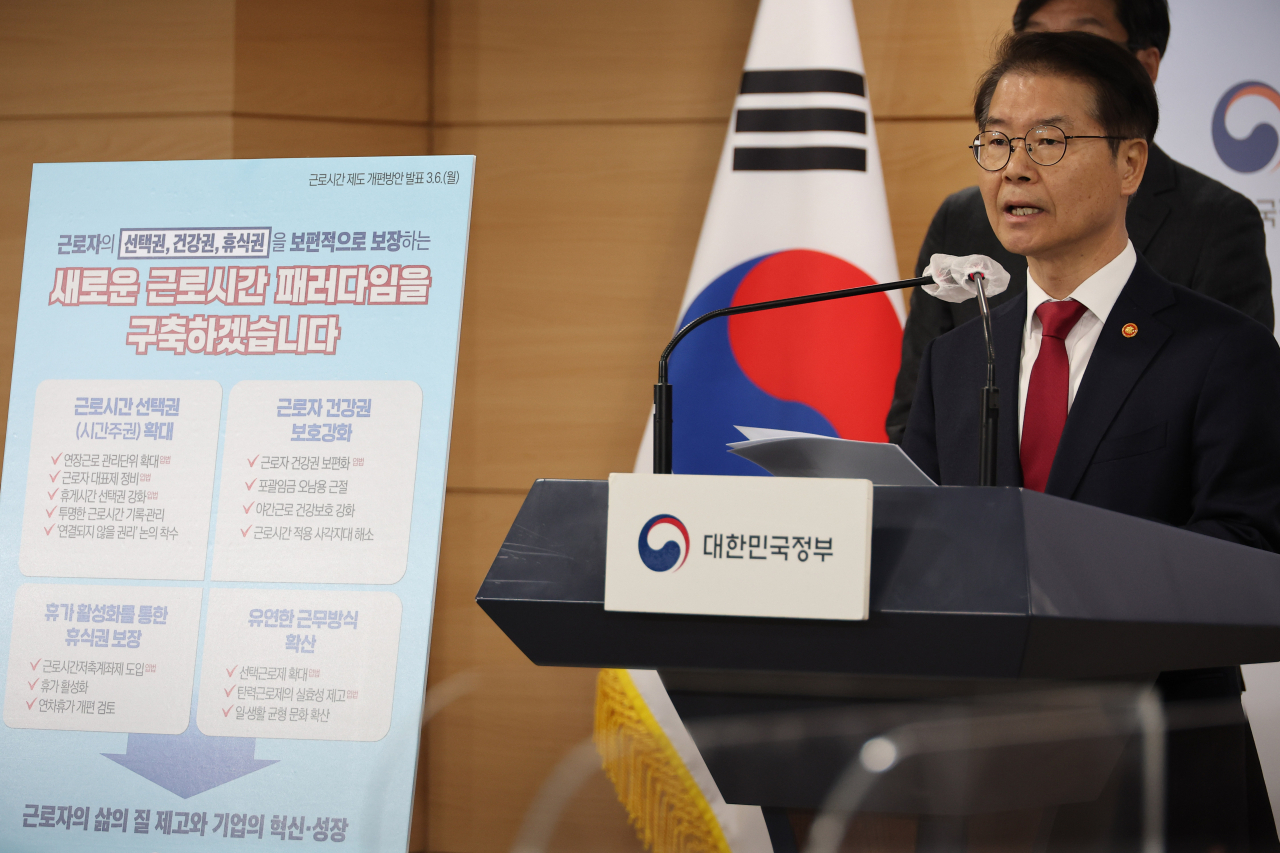Work longer, rest longer: Korea to add flexibility to 52-hour workweek
By Lee Jung-younPublished : March 6, 2023 - 15:17

The government on Monday unveiled a set of plans to revise the current 52-hour workweek to give workers greater flexibility in their working hours.
The current system, introduced in 2018, limits workers to working up to 52 hours a week.
The new plan will allow them to manage the time they work not only on a weekly basis but also on a monthly, quarterly and yearly basis, giving them the option to work up to 69 hours in a week, provided they work fewer hours in other weeks.
This means that during busy periods, workers may choose to work longer hours, and during quieter times, they may choose to work fewer hours.
The increased flexibility comes with increased limits on total working hours. According to the new standards of overtime labor, a worker may work a maximum of 140 hours of overtime per quarter of a year, 250 hours in half a year and 440 hours in a full year, down from. The is equivalent to maximum average working hours of about 51 hours a week, 50 hours a week and 49 hours a week, respectively.
The government will also introduce a new policy which allows workers to save extended working hours and convert them to vacation time. The addition of this new vacation time to existing paid annual vacation time will mean that workers can enjoy longer holidays, like sabbatical months, the Labor Ministry explained.
The flexible working hour system, which allows workers to freely select their working and commuting hours, will be strengthened and improved. Currently, details of the system such as the target workers or the number of days and hours that can be controlled, must first be confirmed in advance. There are also no post-change procedures set in place. The government will come up with a procedure to change the details of the flexible work system through consultation with the representatives of relevant workers.
The current workweek system which holds the company legally accountable for workers who work longer than 52 hours a week has proved to have negative side-effects, Labor Minister Lee Jung-sik said.
For example, employers were unable to recognize working hours beyond 52 hours a week without being penalized, meaning employees who worked excess overtime were not paid for it.
In order to prevent the excessive concentration of overtime work during a specific period, 11 consecutive hours of rest between shifts each day will be mandatory under the proposals, or working hours would have to be kept below a four-week average of 64 hours a week.
The government plans to submit a revision bill to the National Assembly in June or July after a 40-day legislative notice period from Monday to April 17. The opposition parties, which hold a majority, are skeptical about the revision.
The Korean Confederation of Trade Unions, one of two major labor unions in Korea, said it opposed the plan because it will see even longer work hours than before. The union noted that it is only favorable to the part of the plan that permits workers to manage their working hours.
The Korea Enterprise Federation, a business representative organization, welcomed the plan, saying it would add more flexibility to both workers and companies.








![[Graphic News] More Koreans say they plan long-distance trips this year](http://res.heraldm.com/phpwas/restmb_idxmake.php?idx=644&simg=/content/image/2024/04/17/20240417050828_0.gif&u=)
![[KH Explains] Hyundai's full hybrid edge to pay off amid slow transition to pure EVs](http://res.heraldm.com/phpwas/restmb_idxmake.php?idx=644&simg=/content/image/2024/04/18/20240418050645_0.jpg&u=20240419100350)








![[KH Explains] Hyundai's full hybrid edge to pay off amid slow transition to pure EVs](http://res.heraldm.com/phpwas/restmb_idxmake.php?idx=652&simg=/content/image/2024/04/18/20240418050645_0.jpg&u=20240419100350)

![[Today’s K-pop] Illit drops debut single remix](http://res.heraldm.com/phpwas/restmb_idxmake.php?idx=642&simg=/content/image/2024/04/19/20240419050612_0.jpg&u=)